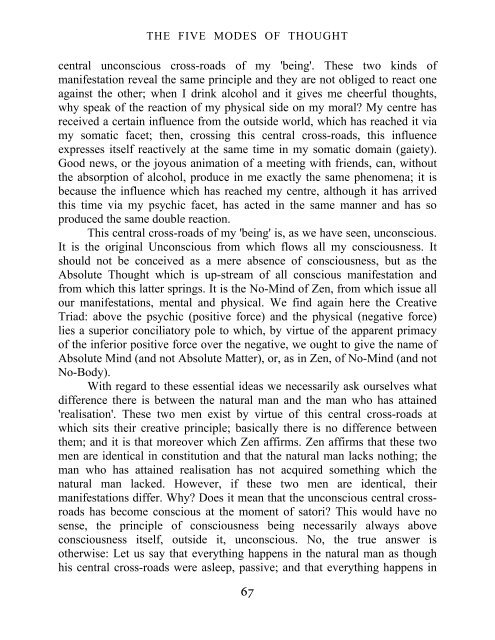The Supreme Doctrine - neo-alchemist
The Supreme Doctrine - neo-alchemist
The Supreme Doctrine - neo-alchemist
You also want an ePaper? Increase the reach of your titles
YUMPU automatically turns print PDFs into web optimized ePapers that Google loves.
THE FIVE MODES OF THOUGHT<br />
central unconscious cross-roads of my 'being'. <strong>The</strong>se two kinds of<br />
manifestation reveal the same principle and they are not obliged to react one<br />
against the other; when I drink alcohol and it gives me cheerful thoughts,<br />
why speak of the reaction of my physical side on my moral? My centre has<br />
received a certain influence from the outside world, which has reached it via<br />
my somatic facet; then, crossing this central cross-roads, this influence<br />
expresses itself reactively at the same time in my somatic domain (gaiety).<br />
Good news, or the joyous animation of a meeting with friends, can, without<br />
the absorption of alcohol, produce in me exactly the same phenomena; it is<br />
because the influence which has reached my centre, although it has arrived<br />
this time via my psychic facet, has acted in the same manner and has so<br />
produced the same double reaction.<br />
This central cross-roads of my 'being' is, as we have seen, unconscious.<br />
It is the original Unconscious from which flows all my consciousness. It<br />
should not be conceived as a mere absence of consciousness, but as the<br />
Absolute Thought which is up-stream of all conscious manifestation and<br />
from which this latter springs. It is the No-Mind of Zen, from which issue all<br />
our manifestations, mental and physical. We find again here the Creative<br />
Triad: above the psychic (positive force) and the physical (negative force)<br />
lies a superior conciliatory pole to which, by virtue of the apparent primacy<br />
of the inferior positive force over the negative, we ought to give the name of<br />
Absolute Mind (and not Absolute Matter), or, as in Zen, of No-Mind (and not<br />
No-Body).<br />
With regard to these essential ideas we necessarily ask ourselves what<br />
difference there is between the natural man and the man who has attained<br />
'realisation'. <strong>The</strong>se two men exist by virtue of this central cross-roads at<br />
which sits their creative principle; basically there is no difference between<br />
them; and it is that moreover which Zen affirms. Zen affirms that these two<br />
men are identical in constitution and that the natural man lacks nothing; the<br />
man who has attained realisation has not acquired something which the<br />
natural man lacked. However, if these two men are identical, their<br />
manifestations differ. Why? Does it mean that the unconscious central crossroads<br />
has become conscious at the moment of satori? This would have no<br />
sense, the principle of consciousness being necessarily always above<br />
consciousness itself, outside it, unconscious. No, the true answer is<br />
otherwise: Let us say that everything happens in the natural man as though<br />
his central cross-roads were asleep, passive; and that everything happens in<br />
67




